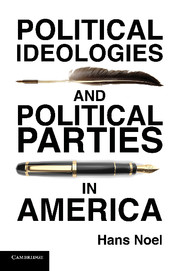Book contents
8 - Conclusion
Toward the Study of Creative Synthesis
Published online by Cambridge University Press: 05 June 2014
Summary
When, in 1947, a sample of Americans was asked if they want to replace the existing Democratic and Republican parties with parties for liberals and conservatives, they were being asked if they wanted to see ideologically defined parties. The ideologies were there, but the parties were not using them. Would they not prefer that the parties match the prevailing ideologies? According to the results of the survey, most voters would not. They did not find ideology meaningful, or at least not any more meaningful than the nonideological parties that they were used to.
But activists did. More than a half-century later, it appears that the activists – and the ideologues – have won. The driving story in this book is that the organization of issues into ideologies matters largely because that organization ends up being the organization of parties. As a consequence, it is activists and politically sophisticated people who get what they want.
This story is at odds with the story we like to tell about democracy. Democratic accountability and representation take place between voters and politicians. Many in the literature (from Schattschneider 1960 to Gilens 2004, and Bartels 2005 ) have noted that the voice of the people is not always representative, that in Schattschneider’s words, the interests that are represented sing “with a strong upper- class accent.” Most scholars still consider this fact a distortion of the ideal relationship – a relationship the more optimistic see as still fundamentally central and descriptive of reality. This book has articulated a different kind of relationship, one that places the self- selected ideological elites at its center.
- Type
- Chapter
- Information
- Political Ideologies and Political Parties in America , pp. 181 - 196Publisher: Cambridge University PressPrint publication year: 2014

